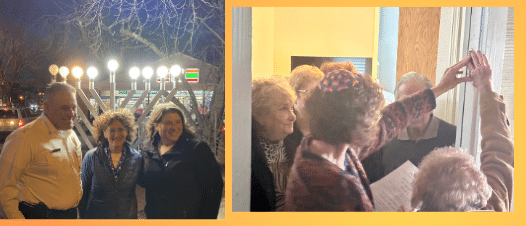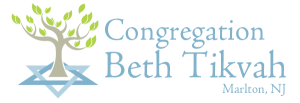
Much has been written in the last few weeks about the convergence of Hanukkah & Christmas. I’m more interested in Hanukkah’s crossover from 2024 to 2025.
Today, the eighth day of Hanukkah, coincides with the second day of the Hebrew month of Tevet and the second day of the month of January, which is the second day of the new year of 2025.
The significance of this connection between Hanukkah and the new year occurred to me while lighting all eight candles of the menorah as New Year’s Day faded into night.
On New Year’s Eve, we countdown the seconds to midnight and celebrate loudly, with singing, fireworks, shouts of “Happy New Year!”
I’ve been wishing people a “Happy New Year,” according to local custom, all week. But I’ve been thinking about how we greet each other differently at the Jewish New Year. Instead of “Happy New Year” we say, l’shanah tovah, “have a good year.” It’s the same way we say, “have a good day;” wish each other shavua tov, a good week, at the conclusion of the sabbath; and offer each other blessings for a good month, ḥodesh tov, on the first day of each Hebrew month.
A good year is not one in which nothing bad happens. When we say l’shanah tovah we’re not suggesting that a purely good year is something attainable. Nor is saying “happy new year” a blessing for a year devoid of sorrow. We know that living fully entails joy and sadness. Each day, week, month and year, we experience both good times and bad times.
On New Year’s Day, many of us strive to begin the year fulfilling the resolutions we made to live better, happier lives. This is also the essence of Hanukkah, as reflected in the meaning of the holiday’s name, which comes from the Hebrew root, ḥet-nun-kaf—to dedicate, consecrate or inaugurate.
Hanukkah simultaneously celebrates the rededication of the Temple in Jerusalem in 165 B.C.E. and our dedication to living better, both as individuals and together as a community.
Whether we’re celebrating the dedication of a home, ḥanukat habayit, by singing blessings and affixing a mezuzah to the doorpost, or celebrating shabbat, by sharing a meal, praying together, or blessing one another at simchas shabbat services as we celebrate milestone occasions, we’re dedicating ourselves to experience the good times together.
The Hebrew root ḥet-nun-kaf also means to educate, guide, tutor or mentor.
When we study together—and we’ll have many opportunities to learn together in the coming weeks and months of 2025—we’re dedicating ourselves to education and to community, to learning from one another’s wisdom. When we volunteer together, we’re dedicating ourselves to improving the lives of our neighbors and our own lives, through acts of lovingkindness.
This eighth day of Hanukkah and second day of 2025, let’s celebrate dedication. L’shanah tovah!
